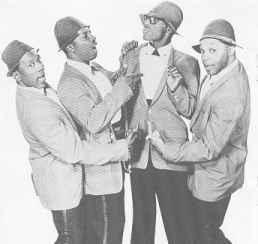It popped out at me while reading Steven L. Isoardi's new history of '60s jazz in South Los Angeles, "The Music Finds a Way." There they were, familiar acronyms with a different meaning: PAPA/UGMA/UGMAA.
In context, PAPA represented Horace Tapscott's Pan Afrikan Peoples Arkestra, and UGMA/UGMAA stood for early versions of the Ark and later for the pianist-bandleader's umbrella community organizations -- the Underground Music Association and the Union of God's Musicians and Artists Ascension. But what made me blink was the phonetic impact, which felt a lot like "Papa Oom Mow Mow," a 1962 novelty number by the black Los Angeles doo-wop group the Rivingtons, cannibalized the next year by Minnesota's white Trashmen. You might have heard later take-offs by the Ramones and the Cramps.
Disregard the spelling, and PAPA/UGMA/UGMAA sounds like "papa oo mama," which could be a description of noises a kid heard behind his parents' bedroom door; the syllables resonate with the "wop-bop-a-loo-bop" in Little Richard's 1955 "Tutti Frutti" and the surprise nudity described in Sam the Sham's 1965 "Wooly Bully." But in the foreward to the Isoardi-edited Tapscott autobiography "Songs of the Unsung," actor William Marshall wrote, "UGMAA meant whatever it needed to mean"; Marshall believed it derived from African words that denoted hunger and creation.
It does seem that Tapscott fitted the acronyms to words that already meant something to him. But what does that have to do with the Rivingtons?
As "The Music Finds a Way" relates, South Los Angeles remained an extremely rich and tight-knit music community well after the '40s/'50s peak of the Central Avenue scene, with clubs, pool-hall jukeboxes, jazz radio stations, public schools and private instructors maintaining excitement about jazz, not just catering to the rising strains of rock & roll, soul, and black pop. And Tapscott, who arrived from Houston in 1943 at age 9, stood in the thick, forming UGMA and leading his own jazz orchestras as early as 1961.
Tapscott and the Rivingtons were certainly acquainted -- Isoardi, through music coordinator Marion Sherrill, has unearthed documentation that Tapscott made arrangements for the group in 1975. Did the Rivingtons know about PAPA in 1962? In "Songs of the Unsung," Tapscott says the Ark began in '61, possibly including all his community activities under the Arkestra heading. Isoardi, though, in his deeply researched "The Dark Tree," reports that the Pan Afrikan Peoples Arkestra was not formally known as such until 1971.
Another possible source of "Papa Oom Mow Mow" arrives via R&B historian Jim Dawson. Dawson was kind enough to phone writer Steve Propes, who had considered helping with an autobiography by late Rivingtons member Al Frazier. Frazier, it seems, told Propes that while Rivingtons bass singer Rocky Turner was in jail, Turner heard a fellow incarceree singing some version, and brought it to the group. "It's possible," Dawson speculates, "that the song was originally some kind of children's playground chant." Maybe Tapscott knew the chant too. Oral history.
Music historian David N. Meyer offers another hint: The 1950s marked Kenya's Mau Mau Uprising against colonial domination, a theme close to Tapscott's heart. Wikipedia gives a possible source of Mau Mau (herein "Mow Mow") as derived from "ma umau" -- our grandfathers, i.e. PAPA. Alternatively, Mau Mau could be an anagram of "uma uma" (herein UGMAA), "a secret language-game Kikuyu boys used to play at the time of their circumcision." "Uma uma" (apologies to Jordan Peele) means "Get out get out."
If the connection between jazz and nonsense-pop seems fragile, keep in mind that the music scene in South L.A. and elsewhere crossed many borders, just as it does now, when jazzman Kamasi Washington and rapper Kendrick Lamar collaborate on each other's records. Even back in 1945, trumpet forefather Dizzy Gillespie sang "Oop Bop Sh'Bam." And Diz birthed "be-bop" along with saxist Charlie "Bird" Parker, whose abstractions surely nourished the creativity of the Rivingtons. Hey, Rocky Turner knew why the caged bird sings. The Rivingtons' best-known song after "Papa Oom Mow Mow" declared, after all, "The Bird's the Word."
* * *
Buy Steven L. Isoardi's "The Music Finds a Way" here.
Get Jim Dawson's music books here.
Read the thoughts of David N. Meyer here.

